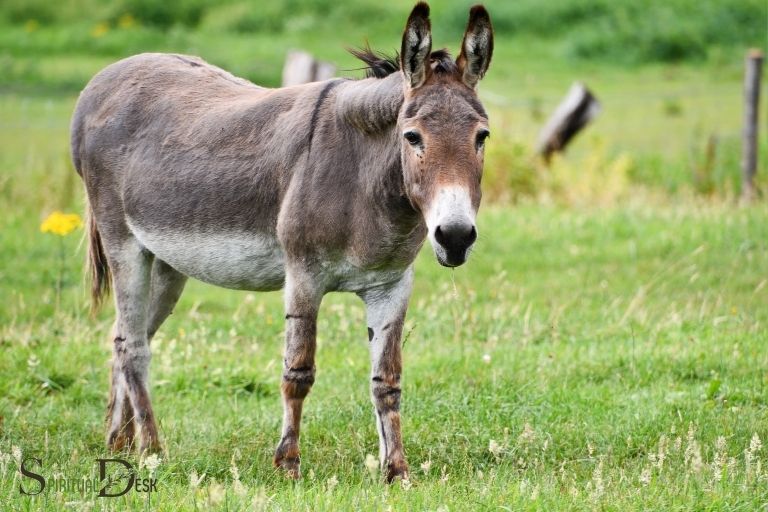What is the Spiritual Meaning of a Donkey? Service!
The spiritual meaning of a donkey is often associated with humility, service, and perseverance.
Donkeys have been mentioned in various religious texts, and they often symbolize the qualities needed to overcome life’s challenges and achieve spiritual growth.
Donkeys serve as a powerful symbol in many spiritual and religious contexts, reminding us of the importance of humility, service, and perseverance in our journey towards spiritual growth.
By embracing these qualities, we can better navigate the challenges we face and find deeper meaning in our lives.
The donkey is typically seen as a positive force, representing strength, determination and perseverance. The Donkey is also often associated with wisdom and knowledge, making it an excellent choice as a guardian spirit animal.
Whether you see the donkey as a protector or simply as a wise creature full of helpful advice, there is no doubt that this powerful animal has much to offer us on our spiritual journey through life.
7 Aspects: Spiritual Meaning of a Donkey
| Spiritual Aspect | Donkey Symbolism | Example/Explanation |
|---|---|---|
| Humility | The donkey represents humility and modesty, as it is a simple and unpretentious animal. | In Christianity, Jesus rode a donkey during his triumphal entry into Jerusalem, symbolizing his humble nature. |
| Service | Donkeys are associated with service and hard work, as they have been used by humans for various tasks since ancient times. | In many cultures, donkeys are considered loyal and dependable animals, carrying heavy loads and working tirelessly. |
| Patience | Donkeys are known for their patience and perseverance, despite difficult circumstances. | In the Bible, Balaam’s donkey patiently endures being beaten by its owner, even though it is trying to protect him from harm. |
| Stubbornness | The donkey is often seen as a symbol of stubbornness, as it can be hard to motivate and can resist change. | In folklore and literature, the donkey’s stubbornness is often portrayed as a negative trait, but it can also represent determination and resilience. |
| Wisdom | Donkeys are considered wise animals due to their cautious and observant nature. | In the Bible, Balaam’s donkey is given the ability to speak and reveals its wisdom by warning Balaam of danger. |
| Peace | The donkey is a symbol of peace, as it is a non-aggressive and gentle animal. | In Christianity, the donkey’s role in Jesus’ triumphal entry into Jerusalem is seen as a symbol of peace, in contrast to the war-horse. |
| Endurance | Donkeys are known for their ability to endure harsh conditions and long journeys. | In ancient civilizations, donkeys were used for their endurance in desert environments and as pack animals for long treks. |
Key Takeaway

Five Facts About: The Spiritual Meaning Of A Donkey
Understanding The Symbolic Significance
Donkeys have been a part of human civilization for thousands of years, often playing significant roles in various cultures and spiritual beliefs.
The spiritual meaning of a donkey carries symbolic significance that resonates with both ancient and modern interpretations.
We will delve into the symbolic importance of donkeys in spirituality and explore their deeper meanings.
An Introduction To Donkeys In Spiritual Beliefs
Throughout history, donkeys have held a special place in spiritual beliefs and symbolism. From the biblical stories to ancient mythology, these humble creatures have been associated with profound meanings.
Here are the key points to understand about the spiritual significance of donkeys:
Divine messenger: In many spiritual traditions, donkeys are seen as messengers from the divine realm.
They are often portrayed as beings that bridge the gap between the earthly and spiritual realms, carrying important messages from the gods or higher powers.
Humility and patience: Donkeys are often recognized as symbols of humility and patience. Their calm nature and unwavering determination serve as a reminder to embrace humility and exhibit patience in our spiritual journeys.
Donkeys teach us to slow down, be present, and stay grounded even in challenging times.
Service and sacrifice: Donkeys are known for their tireless work ethic and willingness to serve. In spiritual symbolism, donkeys represent selflessness and the value of serving others.
They embody the idea of sacrificing one’s own desires for the greater good, reminding us of the importance of compassion, kindness, and generosity.
Endurance and strength: Donkeys are renowned for their remarkable endurance and strength, despite their unassuming appearance.
Symbolically, donkeys inspire us to persevere through difficulties, reminding us that true strength comes from within.
They teach us to have faith in our abilities, embrace resilience, and overcome obstacles on our spiritual paths.
Transformation and redemption: In some spiritual beliefs, donkeys are associated with the idea of transformation and redemption. They represent the potential for personal growth, change, and spiritual awakening.
Donkeys remind us that no matter our past mistakes or limitations, we all have the capability to evolve and find our true purpose.
Donkeys hold a plethora of spiritual meanings and interpretations that have transcended time and cultures.
Their symbolism reminds us of the virtues of humility, patience, sacrifice, endurance, and transformation on our spiritual journeys.
As we connect with the ancient wisdom associated with donkeys, we can gain a deeper understanding of ourselves and the divine forces that guide us.
Donkey Symbolism In Different Cultures
Ancient Egyptian Mythology And The Donkey’s Spiritual Meaning
In ancient egyptian mythology, the donkey held great symbolism and spiritual meaning.
Here are some key points to understand its significance:
- In egyptian belief, the donkey represented the solar barge of ra, the sun god. It was believed that the donkey would carry ra through the sky during the day and assist him in navigating the underworld at night.
- The donkey was also associated with the god geb, who was often depicted as a man with a donkey’s head. Geb was considered the earth god and was believed to bring fertility and abundance to the land.
- Donkeys were often buried with the pharaohs, serving as a symbol of their journey into the afterlife. It was believed that the donkey would guide the pharaohs in the underworld, ensuring their safe passage.
Biblical References: The Donkey’s Symbolism In Christianity
In christianity, the donkey holds a significant place in various biblical stories.
Here is what you need to know about its spiritual meaning:
- The most well-known biblical story involving a donkey is the nativity, where mary and joseph used a donkey to travel to bethlehem. The donkey’s role in transporting the pregnant mary is seen as a symbol of humility, faith, and service.
- In the new testament, jesus rode into jerusalem on a donkey, fulfilling the prophecy of zechariah. This event, known as the triumphal entry, symbolizes jesus’ humility and his role as the peace-bringer.
- Additionally, the donkey is mentioned in the story of balaam, where it displays supernatural abilities by speaking to balaam and refusing to move forward. This incident emphasizes the importance of listening to divine guidance and recognizing the sacredness in unexpected places.
Donkey Symbolism In Hinduism And Buddhism
Donkeys also hold spiritual symbolism in hinduism and buddhism.
Here are the key points to understand their significance in these religions:
- In Hindu mythology, the donkey represents ignorance and stubbornness. It is often associated with the demon kaliyan, who is depicted riding a donkey. This symbolism serves as a reminder to overcome ignorance and strive for spiritual enlightenment.
- In buddhism, the donkey symbolizes humility and patience. It is believed that donkeys possess a level of serenity due to their ability to endure heavy burdens without complaint. This serves as an inspiration to cultivate patience and inner peace in one’s spiritual journey.
By understanding the symbolism of the donkey in different cultures, we can gain insights into the deeper spiritual meanings associated with this humble and often underestimated animal.
Whether as a symbol of strength, humility, or guidance, the donkey holds a significant place in various spiritual belief systems.
Donkey As A Messenger Of Wisdom
Donkeys have been associated with wisdom and intelligence in various spiritual and cultural contexts.
They are often seen as messengers of wisdom, carrying profound messages and teachings. Let’s explore the donkey’s symbolic role in folklore, folk wisdom, dreams, and interpretations.
The Donkey’S Role In Folklore And Folk Wisdom
- In many cultures, the donkey is regarded as a symbol of humility and patience, representing the wisdom that comes from staying grounded and steadfast in the face of challenges.
- Donkeys have been revered for their ability to endure hardships and carry heavy burdens, which serves as a lesson in resilience and perseverance.
- In greek mythology, the donkey was associated with silenus, the wise companion of dionysus. Silenus was known for his ability to impart wisdom and knowledge.
- According to a popular jewish folk tale, donkeys were believed to possess hidden knowledge. It was said that if someone listened closely to the donkeys braying during the night, they could gain profound insights and wisdom.
- In chinese folklore, there is a story of a donkey who became a scholar. This tale emphasizes the transformative power of knowledge and portrays the donkey as a vehicle for intellectual growth.
Donkey Symbolism In Dreams And Interpretations
- Dreaming about a donkey can symbolize the need to embrace humility and patience in your waking life. It may be a message to stay grounded and persevere through challenges.
- A donkey in a dream can also symbolize intelligence, wisdom, and the need to trust your instincts or intuition.
- Riding a donkey in a dream suggests that you are on a journey of self-discovery and growth. It signifies the importance of learning from experiences and gaining wisdom along the way.
- If a donkey appears stubborn or uncooperative in a dream, it could be a reflection of your own resistance to change or accepting advice from others.
- Listening to a donkey braying in a dream may symbolize the need to pay attention to your inner voice and the messages it is trying to convey.
As messengers of wisdom, donkeys offer valuable lessons in patience, humility, and resilience.
Whether in folklore, folk wisdom, or dreams, the spiritual meaning of a donkey teaches us to embrace these qualities and seek wisdom in our own lives.
So, the next time you encounter a donkey, remember the profound teachings it carries.
Donkey As A Symbol Of Humility And Service
The donkey is often associated with qualities like humility and service in various religious and spiritual teachings.
Let’s explore the spiritual meaning of a donkey and the lessons we can learn from its character traits.
The Lessons We Can Learn From The Donkey’s Character Traits
- Humility: The donkey’s humble nature teaches us the value of modesty and the importance of not seeking attention or praise for our actions.
- Patience: Donkeys are known for their patient demeanor and ability to endure hardships. They remind us to have patience in our own lives and persevere through challenging times.
- Hard work: Donkeys are known for their strength and willingness to work tirelessly. They teach us the value of hard work and the satisfaction that comes from putting in effort and dedication.
- Dependability: Donkeys are reliable animals, often used for carrying heavy loads or as means of transportation. They teach us the importance of being dependable and trustworthy in our relationships and commitments.
- Self-sacrifice: Donkeys are known for their ability to carry heavy burdens without complaint. They exemplify the virtue of self-sacrifice and remind us to put the needs of others before our own.
Donkey Symbolism In Religious Teachings And Moral Values
- Christianity: In the christian tradition, the donkey plays a significant role in the story of jesus’ birth. It symbolizes humility and is associated with the journey of mary and joseph to bethlehem. The donkey’s presence in the stable where jesus was born represents the simplicity and humbleness of his coming into the world.
- Buddhism: In buddhism, the donkey is a symbol of ignorance and stubbornness. It represents the uncontrolled mind that resists change and clings to attachments. Buddhists aspire to cultivate wisdom and overcome the donkey-like qualities within themselves.
- Moral values: The donkey’s symbolism extends beyond religious teachings. It serves as a reminder of the importance of humility, service, and selflessness in our daily lives. The donkey’s gentle and patient nature encourages us to treat others with kindness and compassion.
The donkey’s symbolism as a symbol of humility and service resonates across religious teachings and moral values.
Its character traits teach us important lessons about humility, patience, hard work, dependability, and self-sacrifice.
By embracing these qualities, we can cultivate a more compassionate and virtuous way of living.
The Donkey’s Connection To Spiritual Transformation
The spiritual meaning of a donkey goes far beyond its physical presence. Donkeys have long been recognized as symbols of personal growth and spiritual transformation.
They have a special connection to our inner journey, guiding us towards self-discovery and enlightenment.
We will explore the donkey’s symbolism in personal growth and transformation, as well as their role as guides in spiritual journeys.
Donkey Symbolism In Personal Growth And Transformation
- Donkeys symbolize perseverance: Just like these resilient creatures, personal growth requires perseverance and resilience. Donkeys teach us to stay determined and keep moving forward, even in the face of challenges.
- Humility and simplicity: The unassuming nature of donkeys reminds us of the importance of humility and simplicity in our spiritual journey. They encourage us to let go of ego-driven desires and embrace a more grounded and authentic approach to life.
- Embracing stubbornness as a strength: Often seen as stubborn animals, donkeys challenge us to look beyond the negative connotations of stubbornness. They remind us that sometimes staying true to our beliefs and principles, even when others disagree, is an important part of personal growth and transformation.
- Service and sacrifice: Donkeys have historically been used as working animals, serving humans selflessly. They teach us the value of service and sacrifice, reminding us that true transformation often requires selflessness and dedication to a higher purpose.
The Donkey As A Guide In Spiritual Journeys
- Symbolizing balance and grounding: Donkeys are known for their surefootedness and ability to navigate through challenging terrains. In our spiritual journeys, they serve as guides, helping us find balance and stay grounded amidst the ups and downs of life.
- Encouraging self-reflection: Donkeys have a reflective and contemplative nature, encouraging us to take a step back and reflect on our own inner landscape. They inspire us to delve deep within ourselves, questioning our beliefs and motives, and guiding us towards self-awareness and growth.
- Nurturing patience and presence: Donkeys are patient creatures, often portrayed as calm and steady. In our spiritual journeys, they urge us to cultivate patience and presence, teaching us to embrace the present moment fully and to trust in divine timing.
- Leading us towards transformation: Whether in the biblical story of balaam’s donkey or in various spiritual traditions, donkeys have been seen as guides that lead seekers towards spiritual transformation. They serve as companions on our path, showing us the way and pointing us towards the light.
As we explore the spiritual meaning of a donkey, we uncover its profound connection to personal growth and transformation.
These humble beings teach us essential lessons about perseverance, humility, service, and self-reflection.
Whether as symbols or guides, donkeys inspire us to embark on our spiritual journeys and experience deep transformation from within.
FAQ About the Spiritual Meaning Of A Donkey
What Is The Spiritual Significance Of A Donkey?
The spiritual significance of a donkey symbolizes humility, patience, and diligence in many cultures and religions.
What Does A Donkey Represent In The Bible?
In the bible, a donkey represents peace, devotion, and service. It is often associated with prophets and serves as a humble mode of transportation.
What Do Donkeys Symbolize In Mythology?
Donkeys symbolize intelligence, endurance, and divine messengers in various mythologies across the world, representing strength and loyalty.
Why Is A Donkey Considered A Sacred Animal?
Donkeys are considered sacred because of their role in religious stories, their strength in carrying burdens, and their connection to divinity and spirituality.
What Are The Cultural Interpretations Of Donkeys?
Cultural interpretations of donkeys vary, but they often symbolize determination, stubbornness, resilience, versatility, and humility in different societies around the globe.
Conclusion
Donkeys have long been associated with symbolism and spiritual meanings.
Throughout history, they have been considered humble and hardworking creatures that represent perseverance, determination, and faithfulness.
The spiritual meaning of a donkey can vary across different cultures and beliefs, but one common interpretation is that donkeys symbolize service and humility.
They remind us to remain grounded and satisfied with the simple joys of life, rather than constantly seeking material success.
Donkeys also teach us the importance of patience and the ability to carry heavy burdens, both literal and metaphorical.
Whether it be in religious texts or folklore, the donkey serves as a reminder to embrace simplicity, stay true to oneself, and find contentment in the present moment.
By reflecting on the spiritual meaning of a donkey, we can gain valuable insights and appreciate the innate wisdom and lessons that animals can teach us.
Bonus: The Spiritual Meaning Of A Donkey
What Does A Donkey Symbolize Spiritually?
The donkey is a humble and hardworking animal, which is why it has been used as a symbol of faithfulness, determination and endurance.
In the Bible, the donkey is often associated with Jesus Christ and his ministry. For example, in the story of the Nativity, Mary rode a donkey to Bethlehem.
And in the Book of Revelation, Jesus is said to return to Earth on a white donkey. Donkeys also represent strength in other traditions.
In Chinese culture, the donkey is seen as an auspicious animal that represents good luck and fortune.
And in Native American folklore, donkeys are often associated with rainbows and hope. So what does all this mean spiritually?
A Donkey can symbolize many things depending on your own personal beliefs. But some common themes include humility, determination, strength, fidelity and endurance.
What Is the Biblical Meaning Of A Donkey?
The donkey is a domesticated animal that has been used by humans for transport and labor for thousands of years.
The biblical meaning of a donkey can be found in several passages of Scripture. In the Old Testament, donkeys were often used as beasts of burden and were essential to the agricultural economy.
In the New Testament, donkeys play a role in the story of Jesus’ birth and are also mentioned in several parables.
Donkeys are first mentioned in the book of Genesis when Abraham uses them to carry his wife Sarah and their belongings out of Egypt (Genesis 12:16).
Later, when Isaac was living in Gerar, he also used donkeys to travel back and forth between his home and the well where Rebekah lived (Genesis 26:12-14).
When Jacob returned to Canaan after many years away, he rode on a donkey while bringing his wives Leah and Rachel, as well as their children, back with him (Genesis 32:15).
Donkeys continued to be important animals in Israelite society throughout the Old Testament period.
They were used for plowing fields (1 Samuel 8:11-12), carrying goods (1 Kings 5:13; Isaiah 30:6), and even riding into battle (Judges 5:10).
The prophet Zechariah even predicted that one day Jerusalem would be known as “the city of truth” because people from all over would come there “riding on donkeys…carrying their flocks and herds” (Zechariah 14:15).
In the New Testament, donkeys play a significant role in two key stories. First, it was on a donkey that Mary rode when she went to visit her cousin Elizabeth after being told by an angel that she would give birth to the Messiah (Luke 1:39-56).
Second, it was on a donkey that Jesus made His triumphal entry into Jerusalem just before His crucifixion (Matthew 21:1-11; Mark 11:1-10; Luke 19:28-44; John 12:12-19).
This event fulfilled numerous Old Testament prophecies about the coming Messiah. So what does all this mean for us today?
Well, first of all, we see from scripture that God often uses humble means to accomplish His great purposes.
Can a Donkey Be A Spirit Animal?
There’s no definitive answer to whether or not a donkey can be a spirit animal, as it depends on personal belief and interpretation.
In some cultures, donkeys are seen as hardworking and reliable animals that represent strength, determination, and perseverance. They’re also often associated with humility, innocence, and good luck.
For some people, these qualities make donkeys ideal spirit animals. Others may see them as more down-to-earth creatures that offer grounding energy and support during difficult times.
Ultimately, it’s up to the individual to decide if a donkey feels like their spiritual guide.
What Does A Donkey In A Dream Mean?
When it comes to interpreting the meaning of dreams, there is no one-size-fits-all answer. The meaning of a dream involving a donkey will vary depending on the individual’s own personal context and life experience.
However, some believe that donkeys generally symbolize stubbornness or obstinacy.
They may also represent humility, patience, and endurance. In some cases, donkeys may also be seen as negative symbols of laziness or foolishness.
Symbolic Meaning Of Donkey In The Bible
There are many different interpretations of the symbolic meaning of donkey in the Bible. Some believe that the donkey represents humility, while others believe that it symbolizes strength and determination.
Still, others see the donkey as a representation of stubbornness or foolishness.
The most common interpretation of the donkey in the Bible is that it symbolizes humility. This is based on several passages in which donkeys are used as transportation for important figures such as Jesus and Moses.
In these instances, donkeys were chosen over horses or other more regal animals to emphasize the humble nature of those who rode them.
Another interpretation of the donkey in the Bible is that it symbolizes strength and determination.
This view is based on passages where donkeys are used to carry heavy loads or travel long distances. In these cases, donkeys are seen as symbols of hard work and endurance.
This interpretation can also be applied to instances where people are referred to as �donkeys� because they are seen as stubborn or obstinate.
Finally, some interpret the donkey in the Bible as a symbol of foolishness or stupidity. This view is based on several passages where donkeys behave in a foolish manner, such as when Balaam�s ass speaks to him in Numbers 22:28-30.
In this instance, the ass is portrayed as being smarter than its owner, which leads some to believe that donkeys can represent people who act foolishly despite having good intentions.
Biblical Dream Meaning Of A Donkey
The Bible is full of stories and imagery that can be interpreted in many ways. One popular method of interpretation is through the lens of dreams.
Donkeys are often seen as symbols of hard work and determination. They are also associated with humility and service. In the Bible, donkeys are mentioned numerous times and usually represent these positive qualities.
For example, in the story of Balaam and Balak, Balaam’s donkey shows more wisdom than he does when it refuses to walk off a cliff despite Balaam’s urging.
The donkey’s humble act of obedience ultimately saves both their lives. This story teaches us that even the lowliest creatures can have great wisdom to offer us if we are willing to listen.
Donkeys also appear in several parables told by Jesus Christ. In one such parable, a man goes on a journey and leaves his estate in the care of his servants.
One servant is given five talents, another two talents, and the last servant only one talent.
When the man returns, he finds that the first two servants have doubled their money while the last servant has buried his talent out of fear instead of using it to make more money.
This parable teaches us about responsible stewardship and how we will be judged according to our actions while entrusted with something valuable. So what does all this mean for you if you dream about a donkey?
It depends on the context of your dream and what else is going on in it. Generally speaking, however, dreaming about a donkey usually signifies that you need to put in some extra effort or use more caution in some area of your life right now.
Perhaps you’re working too hard without seeing any results; maybe you’re being taken advantage of by someone, or maybe you’re not using your God-given talents to their fullest potential out of fear or insecurity.
Whatever the case may be, take heart knowing that donkeys often symbolize strength, perseverance, and faithfulness. With those qualities on your side, you can overcome anything standing in your way!
White Donkey Spiritual Meaning
When we think of donkeys, we often think of them as being stubborn and uncooperative.
However, the white donkey has a very different meaning in many spiritual traditions. In some cultures, the white donkey is seen as a symbol of purity and innocence.
In others, it is seen as a symbol of strength and determination. Regardless of its specific meaning, the white donkey is often associated with positive qualities and is considered to be lucky.
In Chinese culture, the white donkey is believed to bring good luck and fortune.
It is also seen as a sign of purity and innocence. The Chinese character for “donkey” (?) actually contains the character for “white” (?), which further reinforces this connection.
In Hinduism, the white donkey is revered as an incarnation of Lord Vishnu.
Lord Vishnu is known as the preserver of the universe and is one of the most important deities in Hinduism.
As such, the white donkey represents strength, determination, and perseverance. The White Donkey Spirit Animal can also be interpreted as a representation of new beginnings or fresh starts.
If you have been feeling stuck in your current situation, this guide may be appearing to show you that it’s time for a change.
The key message from the White Donkey spirit animal is to keep moving forward even when things are tough – eventually, you will reach your destination!
Donkey Meaning
When it comes to the word �donkey,� there are a few different meanings that can be derived from it.
Most commonly, a donkey is considered to be a type of livestock that is used for carrying heavy loads and/or transporting people. In some cases, donkeys are also kept as pets.
The term �donkey� can also be used to describe someone who is stubborn or hardheaded. This meaning likely came about because of the animal�s reputation for being headstrong and difficult to control.
Interestingly, the word �donkey� has been used in a number of popular expressions over the years.
For example, you might have heard someone say they were �working like a donkey� to indicate that they were working very hard.
Additionally, the phrase �jackass� is often used as a derogatory term for someone who is foolish or stupid � this too is likely rooted in the donkey�s reputation for being headstrong and unruly.
What Does A Donkey Symbolize In Literature
A donkey is often used as a symbol for foolishness or stubbornness in literature. This is because donkeys are often seen as being uncooperative and difficult to control. They are also known for being slow and not very intelligent.
However, donkeys can also be seen as symbols of strength and determination. This is because they are able to carry heavy loads and keep going even when they are tired.
Donkey In Hebrew Meaning
The word “donkey” in Hebrew is written as ???? and is pronounced, “kh-moor.” It’s related to the Arabic word for donkey, which is ????. The root of both words, ?-?-?, means “to be red,” likely referring to the color of a donkey’s coat.
Interestingly, the Hebrew word for “red” (??????) is also related to this root. In fact, all three words share the same triliteral Semitic root: ?-?-?.
This common root likely gave rise to similar words in other Semitic languages like Ugaritic and Akkadian.
Donkeys were an important part of life in ancient Israel and are mentioned numerous times in the Bible.
They were used for transportation and agricultural work, as well as for carrying heavy loads. Donkeys were also sometimes ridden into battle.
Today, donkeys are not nearly as common in Israel as they once were. However, they can still be seen working on some farms and transporting goods in rural areas.
And while they may not be used quite so often now, these humble animals still hold an important place in Israeli culture and history.
Donkey Political Symbolism
Donkeys have been used as political symbols since the 19th century. The Democratic Party has used the donkey on its campaign materials since 1828.
The donkey was first associated with the Democrats in an editorial cartoon by Thomas Nast, published in Harper’s Weekly on November 10, 1874.
The cartoon shows a donkey clothed in a lion’s skin, labeled “A Live Jackass Kicking Over the Traces.”
This image was intended to represent the Democratic Party’s willingness to fight for its beliefs. The Republican Party has also used the donkey as a symbol, but not as frequently as the Democrats.
One of the most famous uses of the donkey by Republicans was in an editorial cartoon by Clifford Berryman, published in The Washington Post on October 7, 1920.
The cartoon showed a small donkey labeled “GOP” being chased by a large elephant labeled “The Democrat Party.” This image was intended to show how weak and powerless the Republicans were at that time.
Over the years, donkeys have come to represent different things for different people. For some, they are seen as hardworking and reliable animals that represent progress and determination.
For others, they are seen as stubborn and foolish creatures that are resistant to change.
No matter what people think of them, there is no denying that donkeys have played an important role in American politics.






